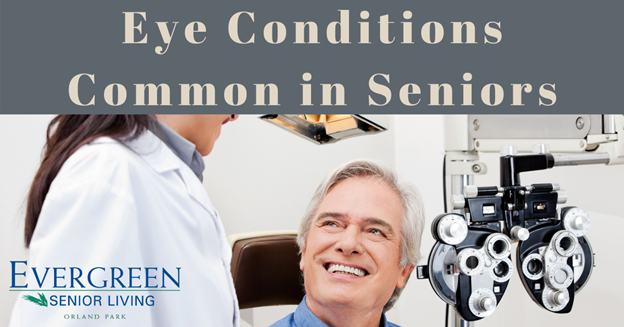Keep an Eye on Vision
Many things can cause vision loss, and it is important to be aware of signs and symptoms of diminishing eyesight. When caught quickly, vision issues can most likely be treated to ensure the impact does not greatly affect one’s lifestyle. Because everyone’s eyes are different, it is unknown how much your vision will be affected as a senior. The best precaution is to get regular eye exams to make sure that any issues are detected at an early stage. As you age, here are some common conditions that you should be aware of.
- Cataracts – Daily activities can become a challenge if cataracts cause your vision to cloud. Cataracts develop slowly and usually affect each eye differently. It is normal for one eye to develop a cataract before the other, which sometimes helps diagnose the second eye more quickly. Doctors will test the optic nerve and retina for damage and also check the overall sensitivity to light and color. When cataracts occur, surgery is usually the go-to countermeasure. The removal of cataracts is safe and effective, with most patients returning home on the same day.
- Glaucoma – When the eye experiences abnormally high pressure, glaucoma can occur. The optic nerve becomes damaged due to the increased pressure and the result is vision loss that cannot be recovered. As a result, glaucoma is a leading cause of vision loss in seniors. Genetics can increase the risk of glaucoma, so it is important to know your family history to assess the risks. Getting regular eye exams is critical to detecting early signs of glaucoma and treating the issues quickly. Typically, when glaucoma is diagnosed, the condition will need to be treated for the remainder of life.
- Age-related Macular Degeneration (AMD) – The most common cause of permanent vision loss is macular degeneration. There are two types of AMD, dry AMD, and wet AMD. Dry AMD is the most common of the two, and is caused when pieces of fat and protein collect under the retina and prevent oxygen from reaching the eye. Similarly, wet AMD is where extra blood vessels begin to form underneath the macula. This form of AMD is more extreme and can cause more damage to the eye at a faster rate. There are a variety of treatment options for AMD, but unfortunately, there is no permanent cure.
The best preventative measure that can be taken is to get regular eye exams. When detected early enough, these conditions can be treated before any large lifestyle impacts occur. At Evergreen Senior Living, our staff ensures that your loved one lives an independent life. Our campus is designed to make living easy! Contact Evergreen Senior Living today and see why your loved one will love it here!






